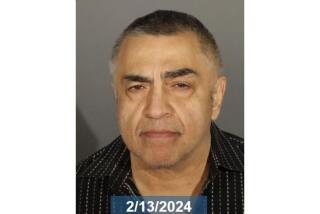Silberman, Convicted on 1 Count, Is Jailed
- Share via
SAN DIEGO — Richard T. Silberman, a former top aide to Gov. Edmund G. Brown Jr., was convicted Thursday of violating a federal currency law in an alleged scheme to launder drug profits. He was immediately sent to jail.
The jury that convicted the San Diego financier of the single count, however, deadlocked on five other counts in the complex case. U. S. District Judge J. Lawrence Irving ordered the panel back to court today for further deliberations.
Silberman faces as much as 10 years in federal prison on the single count, a technical charge of structuring a transaction to avoid the paper work that federal law requires for any cash transaction over $10,000.
The other counts in the case revolve around the central charges alleging that Silberman, 61, laundered $300,000 that was purportedly characterized by an undercover FBI agent as the proceeds of Colombian cocaine trafficking.
Irving said the law required him to send Silberman to jail unless the prominent businessman could show clearly that he was not a flight risk. In light of Silberman’s disappearance and apparent suicide attempt in Las Vegas in February, Irving said, there was no choice but to order him to the federal Metropolitan Correctional Center in downtown San Diego.
Silberman gasped as Irving announced the jailing. He had bit his lip when the jury returned its guilty verdict, but otherwise showed no emotion.
His wife, San Diego County Supervisor Susan Golding, watched from the front row and displayed no emotion at the verdict or jailing. She declined to comment on the proceedings as she left the downtown federal courthouse.
The lawyers in the case, Assistant U.S. Atty. Charles F. Gorder Jr. and defense attorney James J. Brosnahan, also declined to comment, saying a gag order imposed months ago is still in effect because the case is not yet over.
Brosnahan said he will contest the jailing at a hearing on the issue that Irving set for today. He added, “I am sure everyone can understand what this is like.”
Silberman actually has been indicted on seven felony counts in the case; the jury has been given six to decide. The seventh, which is Irving’s to consider, is a criminal forfeiture charge through which prosecutors are seeking the return of the stocks, bonds and cash in the case.
The remaining charges include two counts of money laundering, a single count of conspiring to launder money and two more counts alleging federal currency violations. The trial began May 1.
If convicted on all six counts, Silberman could draw as much as 75 years in prison. Irving did not immediately set a formal sentencing date.
Silberman was arrested in April, 1989, in a San Diego hotel room. Upon arrest, prosecutors contend, he had already made two laundering deals, using cash supplied by the undercover FBI agent--Peter Ahearn, who was posing as Pete Carmassi, a front man for Colombian drug lords--and was negotiating with Ahearn to do a third.
The first deal was a November, 1988, exchange of $100,000 for stock in a subsidiary of Silberman’s gold-mining firm, Yuba Natural Resources. The second was a February, 1989, swap of $200,000 for U.S. Treasury bonds.
According to the FBI, Silberman confessed as soon as he was arrested to laundering the $300,000 and said he was searching for funds to save the financially troubled mining firm.
Silberman testified that he thought the first deal was a legitimate stock sale. He also said in court that he was coerced into the second deal by threats aimed at his family by a government informer, Robert Benjamin.
Four other men were indicted along with Silberman, two of whom have pleaded guilty in recent weeks, each to a single count of violating federal currency laws. The two other men, including reputed mobster Chris Petti, 63, of San Diego, who introduced Silberman to Ahearn, are due to stand trial Sept. 25.
The structuring count charged Silberman with directing a scheme to break the $100,000 supplied by FBI agent Ahearn in the first deal into sums of less than $10,000 for eventual transfer to Switzerland without any records.
The jury’s verdict came two days after it asked for additional guidance on the technical count, seeking to learn when “structuring” began. Over defense objections, Irving provided further instruction.
The jury’s confusion on the other counts was evident Thursday before the verdict in a note sent to Irving that mixed various legal concepts.
Referring to the conspiracy count, the note read: “Does proof of reasonable doubt specify that the $100,000 in the first deal was illegal proceeds in general or they were specifically the proceeds of the importation of narcotics or other dangerous drugs, if entrapment is an issue?”
Silberman has asserted as a defense that he was entrapped--that is, he was induced into crimes, if they occurred, by the FBI.
In response to the jury’s note, Irving told the panel that the answer to their question was in the instructions he had delivered when they began deliberating six days ago.
Irving has not allowed discussion of the purported suicide attempt before the jury, saying it is not relevant to its verdict.
After Silberman disappeared Feb. 15 from San Diego, he was found two days later, unconscious, in a Las Vegas hotel room. Golding said that Silberman, believing he could not get a fair trial before Irving, wrote a suicide note and tried to kill himself with an overdose of sleeping pills.
Silberman, who served as former Gov. Brown’s chief of staff and as secretary of the Business and Transportation Agency, among other positions, has been a key player in statewide Democratic politics since the 1970s.
He was Brown’s chief fund-raiser in his 1976 presidential campaign and had a similar role in Brown’s failed bid in 1980. In San Diego, Silberman helped elect Pete Wilson mayor in the 1970s.
Silberman achieved great wealth in various businesses, particularly in banking and fast food--he was a general partner during the initial years of growth at the Jack in the Box restaurant chain.
However, his most recent business venture, San Diego-based Yuba Natural Resources, consistently had trouble paying its bills, according to trial testimony.
More to Read
Sign up for Essential California
The most important California stories and recommendations in your inbox every morning.
You may occasionally receive promotional content from the Los Angeles Times.













